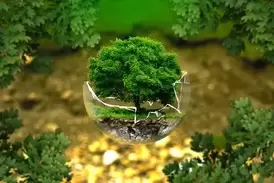 This year, for students interested in addressing environmental concerns, the Writing Arts Department has just begun offering a Certificate of Undergraduate Study called Writing for the Environment. The program allows students to combine knowledge about and advocacy for environmental issues with the reading, writing, and communication skills necessary for success in lobbying, policy writing, project briefs, and communicating one’s position on environmental issues. According to the program’s description on Rowan’s Writing Arts website, “students will learn about the technical, professional, and scientific genres and forms of discourse, while learning to write for a wide range of audiences, including scientific peers, policy makers, and stakeholders in the public at large. Students will develop research, editing, and design skills, and learn how to use these skills in the service of environmental issues. In courses focused on issues relating to the environment and sustainability, students will develop a deeper understanding of the relationship between humans and the environment, focusing on how social norms, cultural attitudes, and political decisions shape the natural world. This CUGS will enable students to forge connections between the sciences, social sciences, humanities, and creative arts to nurture the skills they need to advocate for environmental issues that are important to them and their communities”. Are you a writing student committed to addressing environmental issues? Or maybe an environment student looking to gain the writing skills for advocacy and policy? Then this 12 credit Certificate of Undergrad Studies, Writing for the Environment, would be perfect for you! For more information about Writing for the Environment requirements and courses, check out the advising sheet and the transcribed interviews below! Two professors both took their time to speak with me a bit about this program, it’s courses, what skills they offer, and what careers this CUGS would be beneficial toward. I conducted one with Dr. Ted Howell, who created the Writing for the Environment CUGS, teaches courses in the First-Year Writing program and Sophomore Engineering Clinic, has research focused on early ecology and the Anthropocene, and is currently a Fellow with Rowan’s NEH-funded Cultivating the Environmental Humanities group: Morgan: Would you just tell me a bit about your involvement with this Certificate of Undergraduate Study? Dr. Ted Howell: Sure, so I was asked by the former department chair, Jen Courtney, to create a Writing for the Environment CUGS or some sort of CUGS related to an environmental theme; we were looking for a way to partner with the Department of Geography, Planning, and Sustainability. Over there they had some ideas about making a CUGS and we were just kind of talking about it informally and then decided to go in on it. I thought it would be a good thing for Writing Arts students who were interested in advocating for the environment and writing about environmental issues to learn about some of the content from the environmental studies courses as well as the skills and know-how they would get from Writing Arts courses. They could combine those into something that would allow them to pursue careers in Environmental Advocacy, more broadly, but things like nonprofits or nongovernmental organizations that are focused on environmental issues. Morgan: Could you delve more into the courses, like what are the requirements of the CUGS, and courses available? Dr. Ted. Howell: Yeah, sure, so the way the CUGS works is there’s like a writing arts bank of courses and then an environmental studies bank of courses. Both of them are 6 credits. So in the Writing Arts bank there are three different courses that you can choose from at the moment. They are Introduction to Technical Writing, Scientific Writing and Rhetoric, and Writing for Nonprofit. So you could take any two of those three courses to fulfill the Writing Arts portion of the requirements, and then on the environmental studies bank side again there’s three courses. Two of them are environmental studies courses, one of them is called Environmental Advocacy, the other one is called Human nature, which is basically an introduction to environmental studies as well as environmental advocacy. A Sociology course, Environment Policy and Society, is the other one. So you take two of those three courses to get some of that Environmental contents background, as well as the Writing Arts courses. Morgan: Great! And what sorts of career skills do they learn in these courses? Dr. Ted Howell: Yeah I think a lot of things with career skills, like if you want to pursue a career in Environmental Advocacy or you’re just interested in Environmental writing more generally, a lot of it is with nonprofit groups. If you think about things like the Sierra club, right, there’s a lot of these really pretty large Environmental groups now which have a lot of staff, a lot of sway. They do a lot of lobbying and forming policies and making policy proposals to politicians both at state and local, and even federal level. So there are a lot of these kinds of Environmental Advocacy sort of “Think Tanks” and groups around, and a lot of the work involved in that involves, you know, writing grants, writing project proposals, writing sort of like a policy brief that would be designed for someone higher up to read. So, a lot of the technical writing skills that you learn from a writing arts class really come in handy with that because you have to consume a lot of this sort of technical and scientific information relatively quickly, and then produce it in a very reader-friendly way for this ideal business person that’s all busy busy busy and doesn’t have time to read all of that stuff herself, right? So this way they would be able to condense that, package that into a reader-friendly format, and then have that read by people in positions of power. Morgan: Who are some of the professors involved in this that teach these courses? Dr. Ted Howell: Sure, so here at the Writing Arts side, we have the Intro to Technical Writing course, which a lot of different professors teach depending on the semester. I know one course, that is really sort of central to it as I envisioned it, is Scientific Writing and Rhetoric course with Dr. Grace Fillenwarth, who’s the one that created it and I think she’s the only one teaching it now on this campus, as well as the Writing for Nonprofits course which I know Dr. Jen Tole teaches very often as well as occasionally getting swapped out for other people as well. Morgan: What should students do if they are interested in beginning the program? Is there someone they should contact or do they just register for one of these courses and start that? Dr. Ted Howell: So if you’re interested in registering for this CUGS, like first of all I would be happy to answer any questions about it just to kind of like, if you were interested in “Well how can this help my career, or what are these courses really about? Why would I want to do this?”, just kind of in the more exploratory stage, I would be happy to answer any questions about that. It’s [email protected], that’s my email address, I’d be happy to chat about it. But in terms of actually registering for the courses, they can do that with their faculty advisor, they can talk to Dr. Drew Kopp, chair of the department, as well as pretty much any of the writing arts professors if they just encountered one of them and said “Hey, I heard about this CUGS, do you know anything about it?”. I’m sure any one of the Writing Arts professors could direct them in that way. Or they could visit our Writing Arts Website and look up and read about the details of it there and the advising sheet and get all of those sort of facts and details that they need to know. Morgan: Is there anything else you would like to say about the program? Dr. Ted Howell: I think that I am really excited about this program and I really hope that some students will enroll in it, and really use it as a chance to build these sort of credentials they would need to get these kinds of jobs. A lot of times, if you are just out of college and you have a lot of experience with writing, and you want to get a job at a place that might be a little bit more corporate, even if it’s like a nonprofit right, they’re looking for someone with a specific background. What you really need is some sort of credential on your transcript or on your resume that you can point to and you can say, “Hey, I have this certificate; it’s in Environmental Writing; it’s all about environmental studies”. So you can show them with this proof that you have this sort of content, knowledge, and this experience. As well as, I think even more importantly, if you take these courses and you produce some really cool projects in those courses, you’ll be able to go out on the job market and say “Hey look I really did this awesome project, not only did I learn a lot, but I did this on specific project- here’s some of the stuff that I wrote, here’s some of the stuff that I did” that you can show a potential employer as a way to really show that you not only care about this stuff, but that you have the skills that you need that they’re looking for. The next interview was with Dr. Jordan Howell, who is coordinator of Environmental and Sustainability Studies, studies environmental issues and ways of improving how environmental policy is developed and applied, has research supported by the National Science Foundation and the National Endowment for the Humanities, and previously by the US Environmental Protection Agency, and teaches several courses on environmental & sustainability topics at intro, intermediate, and upper levels including the Writing for the Environment course “Human Nature: Introduction to Environmental and Sustainability Studies”.  Morgan: First, I’d love to hear a bit about the Human Nature: Intro to Environmental and Sustainability Studies course that’s a part of this Writing for the Environment CUGS. Dr. Jordan Howell: So that’s the class that’s one of two core classes for all of our majors and then when we partner with other departments, like for this Writing for the Environment CUGS, we try to include that so that all the people that are learning about the environment on campus have at least a couple classes in common. And so, that class focuses on humanistic and social science perspectives on the environment and knowing the Environment. So we talk about environmental history, environmental policy and economics. We try to answer the question of “What does sustainability mean?”, which is really hard to like, say that it’s one thing at any one time— but it’s like an intro class for all of our students so we thought it was important to include in this CUGS too. Morgan: And how about Environmental Advocacy, that’s another class in the program, so I was wondering about professors teaching it and also just a bit about it? Dr. Jordan Howell: Right now that class is taught by a gentleman named Mark Lohbauer who has been active over his entire career in kind of advocating for different Environmental causes and in South Jersey in particular, but also throughout the state. That class focuses on environmental movements and how they operate, how they organize ways of being effective in advocating for an environmental issue. It’s a newer class so it’s kind of evolving as to what it is, but we thought it was important to have an option for students who are kind of interested in different kinds of advocacy beyond just working for the government. There’s plenty of ways to be concerned about the environment, and so we wanted to explore that in that class. Morgan: Great and so for these classes what kinds of careers exist for students interested in environmental advocacy and policy? Dr. Jordan Howell: Yeah, with those two classes there’s a lot of opportunities to work for environmental groups. So, a lot of times people assume that government is one of the best ways to be concerned about environmental issues as a career, and it is because it has a very important role in dealing with environmental problems, but there’s no shortage of environmental interest groups and kinds of nonprofits and charities out there that all need really talented people so that they can perform their best and help accomplish whatever their mission is. So, we’re hoping with our classes but also with the Writing for the Environment CUGS more generally, that students will be able to step into those types of organizations and help them advocate for positive environmental changes. Morgan: And how is this experience and skills in writing helpful for advocating for these groups? Dr. Jordan Howell: Yeah. That’s a great question, I think it’s kind of vitally important, because we can care as individuals very deeply about some environmental problems, but if we struggle to communicate either our own interest in the environment, or struggle to communicate as to why other people should also care about that problem, it’s really unlikely that it’s going to get solved. So you have to be an effective communicator in writing and in your interpersonal relations with other people in order to get them on board with whatever it is you’re trying to do. Morgan: Is there anything else to want to say with Writing for the Environment and your department at all? Dr. Jordan Howell: I mean I would just add that we really want to encourage students at Rowan to study the environment from as many perspectives as possible. So I mean STEM classes, science and engineering stuff, is really important for understanding the nature of environmental problems and maybe crafting some solutions to it, but there’s so much like human components to thinking about the environment that we want to make sure that students understand that, and that they engage with that, so that they’re able to really engage with the things that they care about. Not everyone needs to be or wants to be highly technical kinds of STEM students, but that doesn’t mean you can’t participate in protecting the environment or advocating for environmental issues. The courses are open to any student interested in the program, so if interested, talk to your advisor about registering for these courses and enrolling in the CUGS!
0 Comments
Leave a Reply. |
Archives
May 2024
Categories |

 RSS Feed
RSS Feed